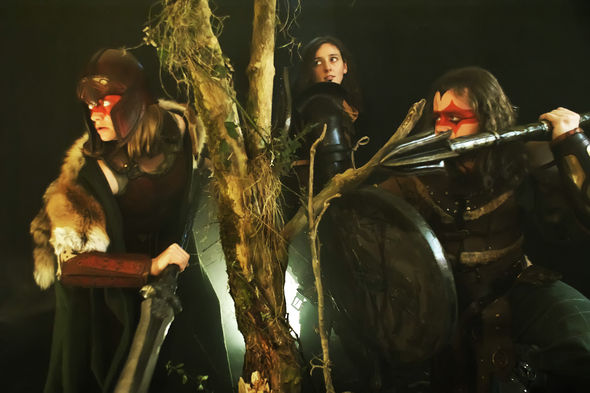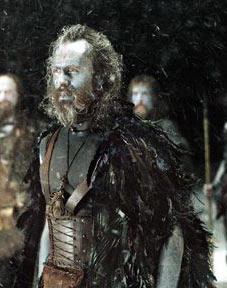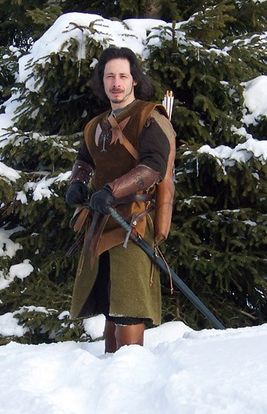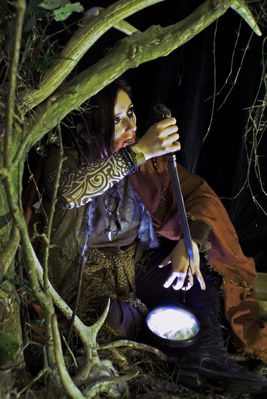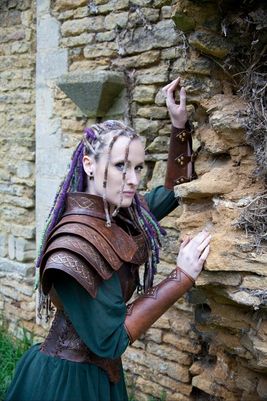Navarr look and feel
Overview
The Navarr look draws heavily on the forests for its inspiration. The colours are primarily greens and browns with occasional splashes of dark autumnal red or yellow. Materials are practical, primarily those that come from hunting - leather and fur. Facepaint, tattoos and brands are common, especially on the face and around the eyes. Navarr mark oaths and other important commitments with brands, tattoos or scars. Most warriors only apply war paint before they go into battle, but some Navarr choose to wear it every day, a symbol of their constant readiness.
Rather than rich materials or unusual colours the Navarr personalize their appearance by adorning their costume with beads, feathers, fetishes, and other accessories. It is common to weave such items into the hair.
Also see Navarr Costumes and Navarr Icons and Artistry.
Feel
Wild, unsettling, otherworldly, alert, pragmatic, tattooed, fierce, primal, blood
Breakdown
Influences
Wood elves, The Rangers from Lord of the Rings.
Materials
Primarily leather and fur. Materials like linen, wool, velvet or silk are less common.
Colours
The palette is the colours of spring: soft greens and browns, gentle misty greys, and perhaps the dark blood red of birthing.
Clothing
Navarr clothing is layered, serviceable and well-worn. Even for civilians, it often features pieces of leather armour, though this is to protect against the environment as much as enemy weapons. Clothes are suitable for people who live their lives in the wild forests. Not just a robust construction but practical designs, for instance hooded cloaks that give protection against the weather, but can also serve as bedding. Belts and straps feature quite heavily – both to secure clothing so it doesn’t snag, and to hold a variety of gear securely while moving through woodland. Boots are long and close-fitting to protect the lower legs while walking.
Jewelry
Navarr favour jewelry that represents the twisting journeys of the Great Dance. Knotted metalwork in either base or precious metals; rings, bracelets, armbands, torcs and brooches are the most common types found.
Armour
Thick hardened leather is the most common form of armour for the Navarr, occasionally supplemented with light chain or scale. Navarr armour often features an asymmetric pattern, with lines and closures that run diagonally across the body rather than vertically but a single breastplate is just as common.
Shields
Shields are narrow and fluted, barely wider than the wielder. They are often heavily decorated with the thorn motif.
Weapons
The iconic Navarr weapon is a spear, often with a barbed shaft and decorated with thorn motifs. This echoes the spear of their legendary hero, Navarr. Otherwise weapons are, light, practical and good for skirmishing rather than heavy combat.
Bows are another favoured Navarr weapon. Like the spear they are an effective tool for hunting as well as a weapon of war.
Costume
Navarr style of dress varies, depending on how much contact the striding or steading has with the other nations. More isolated Navarr may adopt a rougher, more practical or primitive look; more integrated Navarr have access to a greater range of materials. However, most Navarr will fall somewhere in between these two extremes.
More isolated Navarr adopt a look primarily comprised of leather, furs and natural materials, suitable for hunting people who are used to sleeping rough.
Those Navarr who trade with their neighbours are more likely to have access to wool and similar materials so their costume reflects their closer contact with fellow members of the Empire.
Tattoos
The Navarr mark sworn oaths with tattoos, brands and scars, as a visible sign of the commitment they have made. Thorn motifs are the most common design. They use less permanent warpaint on their face or hair when preparing for conflict. Donning the paint helps them prepare themselves and commits them to their course. Many Navarr warriors wear warpaint every day as a sign of their readiness to fight.
Hair
Braids and dreadlocks are common, as are beads and other decorations woven into the hair.
Children
Navarr children are taught the value of being prepared and ready at all times. They are encouraged to learn to fight with sword, spear and bow from an early age.
